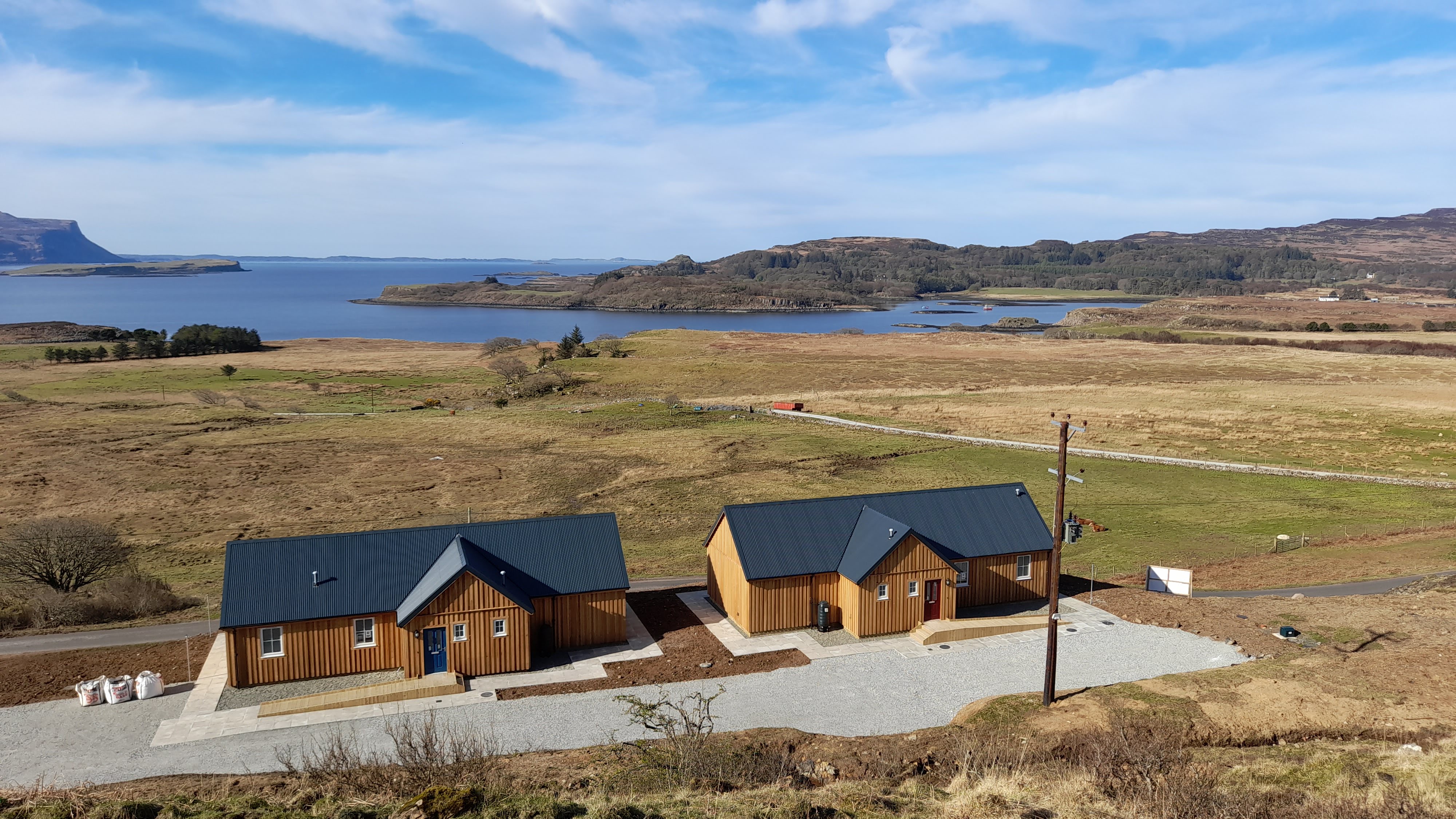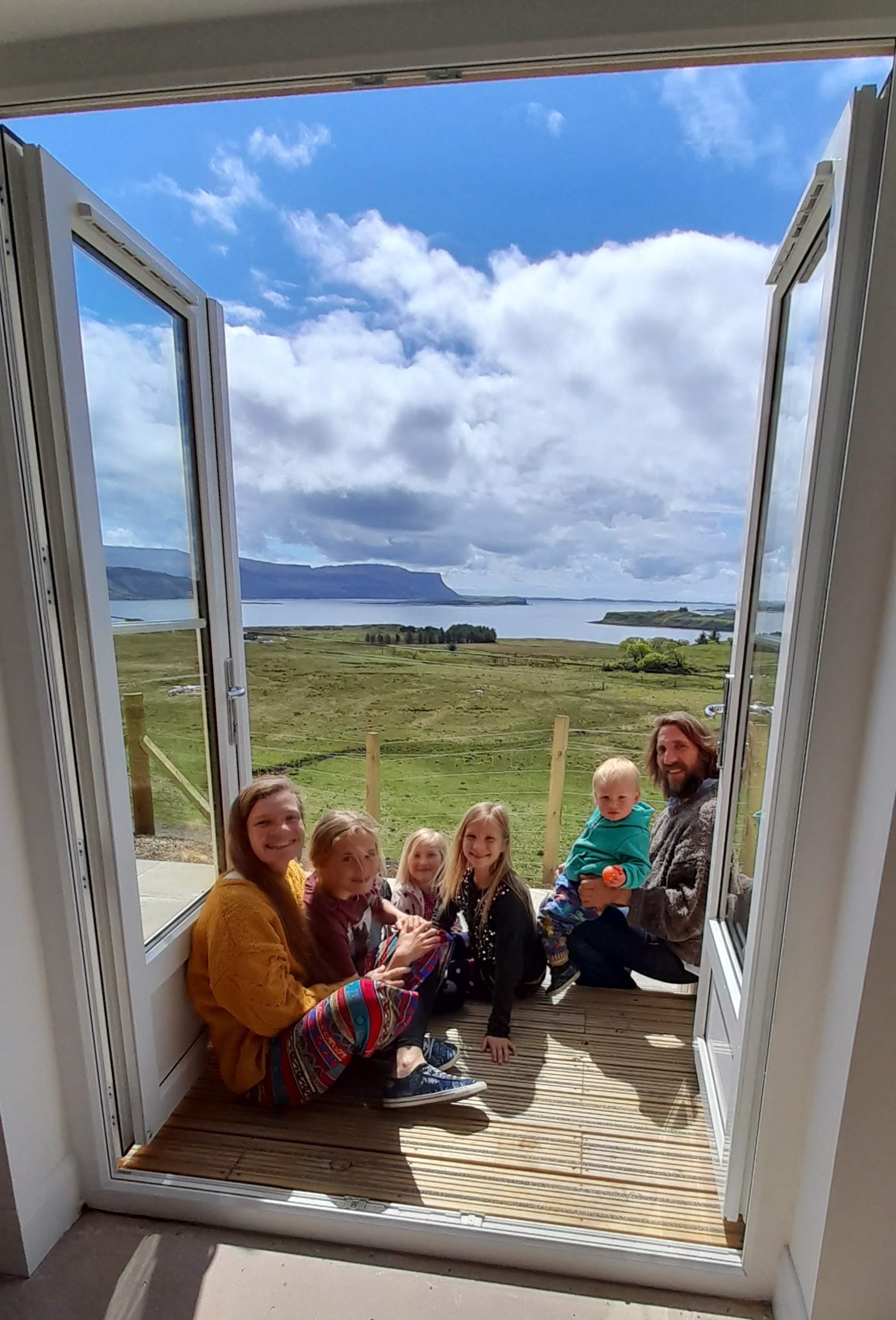Building Briefs - May 21st
- Stirling backs Dementia Friendly City plans with further investment
Stirling Council has underlined its commitment to make Stirling a dementia friendly city with £102,000 investment in infrastructure improvements.

Cllr Scott Farmer (left) and Cllr Chris Kane
Councillors approved an additional £52,000 spending at March’s budget meeting following previous spending commitments of £50,000 made to improving dementia friendly infrastructure in 2020. It follows a decision to implement the recommendations of a report commissioned by the council from the Dementia Services Development Centre based at the University of Stirling.
The additional funding will ensure that changes outlined in the report can be applied more widely across Stirling’s communities.
Stirling Council started developing initiatives to support its dementia friendly aspirations in 2019, which are aimed at improving the accessibility of the City Centre for residents, workers and visitors.
A report (Making Stirling a Dementia Friendly City – A Citizen Led Places and Spaces Project) was commissioned as part of that work to provide expert insight and clear recommendations.
The project conducted a series of audits on public buildings, spaces and routes in between them. This included Stirling Bus Station, Albert Halls and other city centre properties.
The findings of the report are to be implemented over the next two years, with £15,000 already designated specifically to deliver dementia-friendly improvements at Stirling bus station prior to the budget meeting.
- New lease of life for Edinburgh’s Tron Kirk
Councillors have given the green light to Scottish Historic Buildings Trust (SHBT) to take forward the restoration of the much loved Tron Kirk on the Royal Mile, giving the building a new and meaningful lease of life for residents and visitors to enjoy for generations to come.

The decision by the City of Edinburgh Council’s finance and resources committee has secured the long-term future management and maintenance of this historic building.
Working in partnership with the council, SHBT will develop a feasibility study to set out a future vision for the Tron Kirk and when fully funded the charity will sign a 125 year lease for the building. In the short term the charity will fulfil a management role for the Tron Kirk liaising with all existing and new tenants to make sure that the building is open for business as soon as possible.
- Gladstone’s Land reopens following revamp
The National Trust for Scotland’s (NTS) Gladstone’s Land has reopened after a £1.5 million restoration.
The building closed in February 2020 and was due to open its doors again last August. However, that was delayed due to the pandemic.
The six-storey tenement was saved from demolition by the trust in 1934 after the apartments were condemned as unfit for human habitation.
Over the last 40 years the focus of the exhibits was mainly on the life and times of merchant Thomas Gladstone, who bought the building in the early 17th Century, extended it and commissioned its Renaissance-style painted ceilings.
But following years of research led by NTS visitor services managers Dr Kate Stephenson and Anna Brereton, the lives of other residents of the property over the centuries are also being told, with three floors of rooms laid out to reflect how they would have lived and worked.
A new coffee shop and ice cream parlour have also been created at street level, with flavours including elderflower and lemon curd – inspired by records related to the first sales of ice cream in Edinburgh in the 1900s.
- Lockhart Campus set to open in August
North Ayrshire Council has confirmed its new Additional Support Needs School will open in August.
It had been hoped that there would be a ‘soft’ transition to Lockhart Campus for pupils and staff prior to the summer holidays beginning.
But after discussions with contractor Morrison Construction, it has been agreed to move the opening to August.
Whilst the facility is close to completion, the pandemic has slowed construction down and there have been various supply issues which have hindered progress.
It is expected that all pupils will be in Lockhart Campus on August 24. The new ASN school – situated next to Auchenharvie Academy - brings the pupils of Haysholm, Stanecastle, James Reid and James MacFarlane together.
The school is being built as part of a joint initiative with North Ayrshire’s Health and Social Care Partnership. Sitting next to the school will be two Respite facilities - Roslin House will cater for young people and Red Rose House for adults. A decision on when these facilities will open is expected shortly.
- Half a million investment for green spaces, sports facilities and play parks in Renfrewshire
More than £520,000 is to be invested into community projects from Renfrewshire Council’s Green Spaces, Parks and Play Areas and Villages Investment Fund.
The £1.87 million fund is open to community groups from across Renfrewshire to submit ideas for local improvements with more than £700,000 already awarded to 32 projects.
Councillors have now approved a further ten projects worth £522,466 which will include upgraded tennis courts and a brand-new Multi-use Games Area (MUGA) in Langbank, a new outdoor gym in Ferguslie Park Gardens and a brand-new community park in Spateston.
For more information on the fund, visit www.renfrewshire.gov.uk/GreenSpacesFund.
- South Lanarkshire town centre plans set to help with Covid recovery
More than £20 million of investment in regeneration and development for South Lanarkshire town centres is continuing to make progress.
A report has highlighted the significant progress being made by South Lanarkshire Council and a wide range of partners in making the most of town and village centres for community and businesses despite the impact of the pandemic.
The update delivered to the council’s community and enterprise committee has laid out in detail the funding being secured to support development, the work currently in progress and the continuing long-term strategic planning.
Work included in the town centre programme includes new social housing, investment in business and retail premises, streetscape improvements, community facilities and more.
A full list of projects can be found in the committee report.
- Council to grant 25-year lease of Stepford Sports Park to social enterprise
Glasgow City Council has granted a 25-year lease of Stepford Sports Park on Edinburgh Road to FARE Scotland Limited, a local social enterprise.
Stepford Sports Park is currently leased to Glasgow Life. FARE, a social enterprise based in Easterhouse which aims to help meet the social, economic and physical needs of communities, is currently operating the facility in conjunction with Glasgow Life, and now wish to take sole control under a (now agreed) new long-term lease to allow them to redevelop the facility having secured the necessary funding.
The existing lease between Glasgow City Council and Glasgow Life - which was due to expire in 2032 - will now end, with the proposed new lease terms between the council and FARE, based on a 25-year term at concessionary rental level, approved.
The facility currently features one 3G full size football pitch, two full size grass football pitches, showers and changing rooms, and space for approximately 50 car parking spaces.
Due to the impact of the pandemic, Glasgow Life was unable to keep the facility open, and so worked with FARE to develop a Community Activation Pilot Licence to reopen with an operational model which maximised the resources available, minimised operational costs, whilst providing football facility access to local communities. This licence was for a six months period ending 23 May 2021, thereafter continuing as a rolling month-to-month agreement.
Through the People Make Glasgow Communities programme, this community pilot project was viewed as one which successfully met the principles and outcomes of the programme. The pilot sees a minimal number of Glasgow Life staff supplemented by FARE’s key representatives/staff to oversee the agreed opening hours and the current programme of activity at the venue, and has provided an opportunity to share resources, build relationships, and consider at other operating models following the trial period.
FARE had identified that the facility would benefit from a £2m investment programme, and so developed a proposal that the (underused) two grass pitches there be replaced by one full-size 3G synthetic football pitch and four 5-a-side football pitches with appropriate fencing and floodlighting.
The social enterprise has now secured £1.6m in funding from Social Investment Scotland for the first phase of the redevelopment, to be drawn down by the end of June. The minimum lease of 25 years on the facility was key to securing this funding.
In addition, FARE has begun discussions with The National Lottery on potential funding of the second phase of the project, which would not only lead to a redeveloped facility, but also provide a base to carry out and build on the other community work they deliver in the city.
- Drumbeg road resurfacing completed in Sutherland
The Highland Council’s Sutherland Road’s Team has completed resurfacing works on the B869 Drumbeg – Nedd loop road which is part of the NC500.
This is one of many road projects completed on The Highland Council’s 6,754km of road network that the local authority is marking in its recent #HighlandRoadsRecovery campaign.
£140K of the Sutherland Area’s prioritised capital works programme for 2021/22 has enabled 3.5km of the B869 road to be resurfaced.
- Tenants move into new homes on the Isle of Mull
Four years after embarking on an ambitious project to deliver four affordable homes at Ulva Ferry on the Isle of Mull, Mull and Iona Community Trust (MICT) handed over the keys to the new homes on Wednesday.

Just ten years ago, the local primary school was threatened with closure, and now - thanks to the efforts of the community - Ulva Ferry is well on its way to a sustainable future.
Following years of feasibility work and fundraising to purchase land and meet the construction costs of this £1.3 million project, four houses have been built by modular contractor The Wee House Company, to meet an acute housing need on the island, and to support the local primary school roll. 31 applications were received and a locally agreed, points-based, allocation policy was used to choose tenants.
Working closely with Ulva School Community Association (USCA), MICT identified an ongoing housing need following the completion of their first affordable houses in 2017, including a need for smaller houses for young people and older members of the community, as well as family-sized homes. Tenants have the comfort of secure tenancies, affordable rents, and high quality, energy efficient homes.
While MICT is a registered private landlord, it is working with West Highland Housing Association, which offers assistance with allocations, management support, and advice to tenants.

All four new tenants have experienced significant housing need and are thrilled to be moving into their new homes and being part of the Ulva Ferry community.
The delivery of these houses will secure the future sustainability of the fragile Ulva Ferry community, increasing the resident working age population by 10% and the school roll by 50%. From August there will be 15 primary age children at Ulva Ferry, of which 11 will live in housing owned by MICT.
This project was made possible via grants from the Scottish Land Fund, the Scottish Government’s Rural & Islands Housing Fund and Argyll & Bute Council’s Strategic Housing Fund, a mortgage from Ecology Building Society, and many local donations.
Funding for the Project Officer’s post to manage the delivery of the project was provided by The Prince’s Countryside Fund, Nationwide Foundation and Highlands & Islands Enterprise. Invaluable support has been provided by Rural Housing Scotland, Community Land Scotland and West Highland Housing Association.
Thanks to the innovative modular design, construction on site by The Wee House Company took just seven months and was completed on budget, despite taking place during the Covid-19 pandemic and a very cold winter.
Each house is made of between four and six modules, depending on the size of the finished home and 90% of construction was completed under factory conditions in the company’s Cumnock facility, meaning site preparations could be completed in tandem. From delivery of the modules to residents moving in took a matter of weeks.
- Local procurement supported by Grampian Housing Association
More than 85% of Grampian Housing Association’s annual procurement spend in 2020/21 went to local suppliers and contractors in Aberdeen and Aberdeenshire, its new annual procurement report has highlighted.
Of the remaining spend, the most significant amounts were for national companies/consultants/software providers where local options are more limited.
The Association encourages potential suppliers and contractors to register with Public Contracts Scotland (PCS) and to take part in the Supplier Development Programme to ensure they are fully aware of contract requirements and they are supported to submit the best possible tender.
Demonstrating its commitment to ensuring that procurement is transparent, Grampian said its objective is to use PCS for all regulated and non-regulated contracts each financial year.
Last year the Association’s procurement was the subject of an internal audit exercise. Among the recommendations implemented were the inclusion of a Modern Slavery Statement in the Association’s procurement strategy and policy and work with existing and prospective suppliers/contractors with a view to ensuring that the real living wage is paid to all their employees. Training was also provided to the leadership team to ensure a consistent approach for procurement is embedded throughout the organisation.
Since March 2015, the Scottish Federation of Housing Associations (SFHA) has worked in collaboration with the Scottish Procurement Alliance to deliver a procurement advisory service for RSLs across Scotland. This followed the introduction of the Procurement Reform (Scotland) Act 2014 which resulted in major changes in public procurement. This has had a significant impact on how housing associations conduct their procurement activity. The Association said it is also open to exchanging good practice with local authorities and local housing associations.
Grampian Housing Association advertises all tender opportunities on Public Contracts Scotland, the national advertising portal for the Scottish public sector to advertise contract opportunities and public contract awards.













